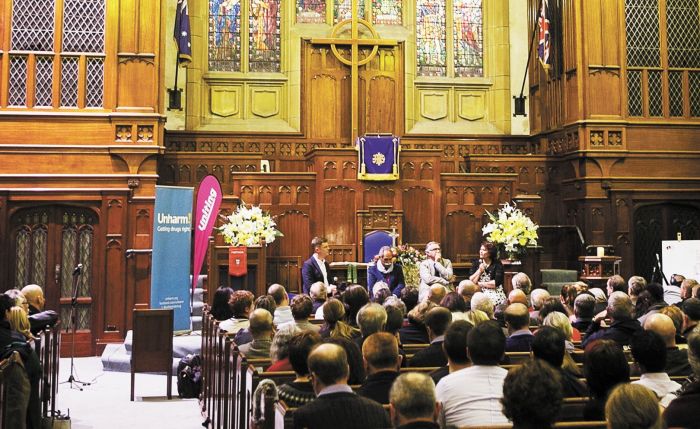
Over 700 people braved rain and cold on June 5 to line the pews of historic St Stephens Uniting Church in central Sydney. In some ways, an unlikely gathering – Uniting Church members (many of them older) mixing with recreational drug users (many of them younger), people from politics, public health, law and enforcement, families harmed by illicit drugs and by existing “zero tolerance” policies, and many more.
They came together for two main reasons. First, a shared conviction that our current laws on personal illicit drug use are not working (high death and harm rates, use not decreasing) and are actually creating more harm. And second, to hear from a man whose country had done something to turn this around: Dr Manuel Cardoso, medical doctor and public health expert, and a key figure behind Portugal’s 2001 decriminalisation of personal drug use and shift of resources into treatment.
The evening was hosted jointly by Uniting and Unharm – an organisation that campaigns for drug law reform and one of more than 60 not-for-profit partners in our church’s campaign for decriminalisation and better treatment. Uniting’s involvement stems from the 2016 resolution by our Synod to work for greater investment in drug treatment and harm reduction programs and to advocate for decriminalisation of personal possession and use.
Other speakers included Dr Marianne Jauncey, Medical Director of Uniting Medically Supervised Injecting Centre, and former Western Australian Premier Geoff Gallop. Will Tregoning, founder and Director of Unharm, interviewed Dr Cardoso on what Portugal did and why.
Dr Cardoso outlined the history of Portugal’s concern over deaths from overdoses, a sharp rise in HIV infection and other problems stemming from drug use and addiction. A government commission determined a new approach, based on evidence and pragmatism. It included decriminalisation of possession and use of illicit drugs as part of a comprehensive raft of programs for people adversely affected: initiatives on prevention, treatment and social reintegration, including employment. At the heart of this model, said Dr Cardoso, was the conviction that a person with an addiction “is someone who needs help, needs treatment, not someone who needs to go to jail, to be punished”.
People found by police with illicit drugs weren’t sent to court and possibly prison, but to a “dissuasion panel” which assessed their use in a whole-life context. Those with addiction problems were referred to treatment, others provided supports to rethink and change their drug use. Civil sanctions could still apply for those refusing assistance.
Since the reforms, the benefits for the Portuguese community have been pronounced.
Deaths from overdoses have drastically reduced to just 0.35 per 100,000 people. By contrast, Australia’s overdose death rate is more than twenty times that figure and rising.
Other benefits have included falls in problematic drug use and HIV infection, and big savings for the criminal justice system and in other social costs. Nearly two thirds of those referred to dissuasion panels say the process has changed their lives for the better; almost three quarters say it’s led to reduced or less risky drug use. Importantly, police have supported the changes – which have freed scarce resources and time for better investigation of major suppliers and international trafficking.
Audience questioners included Marion McConnell from the Uniting Church Canberra Region Presbytery – a prime mover behind Uniting’s initiative. She told of her son’s death from heroin overdose, propelling her and late husband Brian into a 25-year struggle for drug law reform. Marion spoke of her frustration that crucial changes in NSW legislation had not yet been made, and finished with a plea that change would finally come. This brought the loudest applause of the evening.
Uniting’s new Executive Director, Tracey Burton, commented: “The gathered crowd affirmed Uniting’s position of shifting drug use from a criminal act to a health issue, so that life-changing help can be provided. Over 700 people, out in the rain, getting behind this critical campaign. Extraordinary!”
Uniting will continue its work for drug law reform and to partner with other organisations of goodwill who share our conviction on the need to find a better way.




